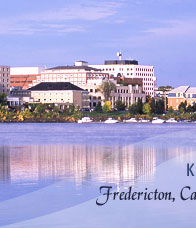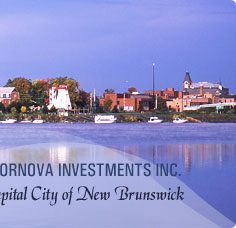Metro thrives where others struggle
01/03/2013
When the Canada Mortgage and Housing Corporation announced just before Christmas that Moncton, among all of Canada’s metropolitan areas, had the greatest household growth, Moncton Mayor George LeBlanc said it went well with one of the other distinctions and honours the city had received in recent months.
The only problem was in a year end interview, he couldn’t quite recall off the top of his head what that other distinction was,
“I can’t even keep them all straight,” he admitted.
Indeed, while many other North American cities have struggled to keep their affairs in order during the lingering effects of the 2009 recession, LeBlanc was relieved and proud to be able to say, “I think Moncton is faring exceptionally well in all of it.”
He admitted some of Moncton’s survival and growth in difficult times comes down to forces largely beyond any one person’s control, including of course a bit of chance.
However, “as someone famous once said, ‘you make your own luck,’ ” LeBlanc said.
Metro Moncton’s population growth in the past few years, the best in all of Canada east of the Prairies, has been all the more remarkable because things are bad elsewhere, including in New Brunswick overall.
Canada’s economy is displaying fresh symptoms of a slowdown, with data released Dec. 21 showing inflation falling to the lowest level in three years and output barely growing.
Statistics Canada’s consumer price index fell four-tenths of a point to 0.8 per cent in November — the lowest since October 2009, when the country was just emerging from a deep slump.
Meanwhile, the economy grew by a minimal 0.1 per cent after a flat month in September and 0.1 per cent contraction in August. Over the past three months, Canada’s economy has essentially not grown.
Closer to home, New Brunswick’s stubbornly high unemployment rate dropped slightly in November, according to the latest Statistics Canada figures, but the unemployment rate is still 1.4 per cent higher than it was in November 2011.
Worse, New Brunswick’s rate is significantly higher than just five years ago. In 2007, the province’s average annual unemployment rate was 7.5 per cent, representing a low point of more than 30 years. It has climbed steadily since then, bucking a national trend since 2009 that has seen job numbers climb in other provinces. The double-digit unemployment figure has raised fears that New Brunswick could return to the same kind of sorry job figures it suffered between 1976 and 2004, never going below 10 per cent unemployment in annual average counts.
However, Metro Moncton’s economy will grow by 2.1 per cent in 2012, and that pace is expected to accelerate in both 2013 and 2014, according to The Conference Board of Canada’s first-ever Metropolitan Outlook for the Moncton Census Metropolitan Area, released earlier this year
“Economic growth in 2012 will be fuelled by continued strength in manufacturing and a rebound in the services sector. In 2013 and beyond, a rebound in the construction sector will add further strength to the Moncton economy,” said Mario Lefebvre, director, Centre for Municipal Studies at The Conference Board of Canada.
Moncton’s mayor is cautious. Despite Moncton’s economic Teflon, “that’s not to say we’re immune from everything. There have been some job cuts,” LeBlanc notes.
“In terms of economic development, as a municipality we try to set the table and make it easy to do business here. It’s not just about economics. It’s about quality of life.”
The quality of life that people are finding appealing are affordable houses, low crime rates and the amenities of city life amidst small town commute times. As well, all three communities of Metro Moncton have worked hard on recreation and healthy living and cultural opportunities for citizens.
Then there’s a healthy retail sector, which offers the services people want and the economic boost of jobs and property taxes. In 2012, after a few years when things had cooled off, that highly visible sector of the economy took off again in earnest. Nowhere was that more visible than on Mountain Road and Mapleton Road, where there has been so much development the Times & Transcript offered a special feature last summer to show readers what was essentially a program to keep track of it all.
But retail, and the proliferation of apartment buildings going up all over the tri-community, are just the visible signs.
“We have an extremely diversified economy these days,” Moncton’s mayor said.
Also helping the economy, “we have a highly regarded workforce here. I hear that all the time,” he said, recalling it is what CEOs tell him whenever they’re expanding their operations in the city.
“I hear how the work force in Moncton outperforms workforces across the country.”
He understandably didn’t want to cause a corporate leader grief with that company’s workers by naming names, but LeBlanc said, “I was at a job expansion announcement this past year. They have operations all across the country and they talk about the productivity and customer satisfaction. Our location as the hub of the Maritimes helps, but also we’re the only official bilingual city in Canada and that means a bilingual workforce.”
As for Moncton being the geographic hub of the Maritimes, “it still does count,” he said, noting how many top trucking companies are based here. As well, our airport’s busy and we’re the sport and entertainment centre of Atlantic Canada.
The mayor of the metropolitan area’s largest city, says he’s optimistic about 2013.
All in all, things are good in Metro Moncton, and, “I think we tend to take it for granted,” he said.
by Brent Mazerolle
times & transcript staff
|





